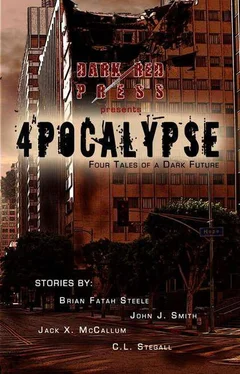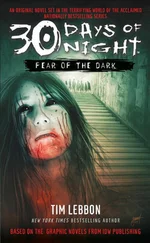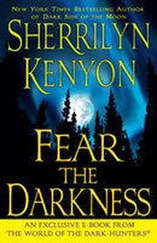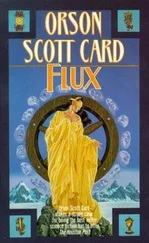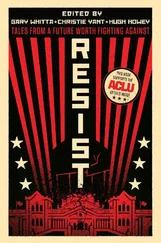I moved with deliberate speed, standing and snugging my .45s, Wilma and Betty, back into their custom holsters. It was dangerous to be caught out in the open; I needed to get to cover in case these two were part of a larger group. I inspected the bodies, retrieving anything I could use. There wasn’t much. The one who had bonked me on the head had a gun — an old Beretta — which I stuffed into my small backpack. I wondered why he had not just shot me, but then decided he probably preferred his rapes to be interactive.
I continued northeast through the town that used to be called Las Cruces. No one was left here to call it anything other than the Town. The blow to the head had jumbled my thoughts, everything seemed out of order, but I remembered. I remembered a lot more than I expected. I remembered that I’d been heading north when the ruffians attacked. Now, though, my memories had returned in full and I knew where I had to go. I walked along Main Street, past Apodaca Park. The park had once held a decent golf course. Now the desert had reclaimed it and there was little greenery in sight but for a few sparse trees that dotted the landscape.
I made my way across to Spitz, meandering through what had been local residential areas, scanning houses for garages that still had cars parked inside out of the weather. After breaking more than a few windows, checking for keys and inspecting gauges, I found a car with an almost full tank. I had to climb on top of the old Ford to jerk on the door opener cord to release the garage door. Once I could raise the door I pushed the car out into the street. I’d never actually found a car with a working battery, but Derrick had shown me how cars with a manual tranny could be bump-started pretty easily. No sense walking all the way to White Sands, even though I was not big a fan of automobiles. I much preferred motorcycles when I could find them.
I revved the engine, which sounded remarkable given its age, and set off toward State Highway 70 and Alamogordo.
Alamogordo sits at the edge of the Tularosa Basin, at the foot of the Sacramento Mountains. Before the world died, it had mostly been a military town. With Holloman Air Force Base and the White Sands Missile Range not far away, in the middle of the basin, Alamogordo thrived in its own small way.
I cruised along White Sands Boulevard. One of the results of the rapid spread of the pandemic was that most people had not been on the road when they died. Most had passed away at home, only a minority lived long enough to die in a hospital.
Road travel these days, should one find a working, gassed-up vehicle, was a breeze. I turned onto 16th Street and eased along the road to my uncle’s house, scanning everything around me, trying to spot anything that seemed out of the ordinary. It had been quite a while since I was last here. I remembered that this was where we had placed the stash. It was also where I knew I would find what little refuge I had left in this desolate fucking world.
* * * * *
“We’re going to have to be prepared for the coming days, Rock,” Derrick had stated. He had taken me to his house and then down into the secured basement that had been built as a fallout shelter. My father and uncle Derrick were always concerned that living next to a missile range and Air Force base made the locale a possible strategic target and had built accordingly. The shelter was large enough to house a family of five and was encased in eighteen inches of concrete; walls, floor and ceiling. It had its own air filtration system and several large oxygen tanks sat in one corner. If the air outside was too toxic, the room could be sealed completely.
When I saw the shelter for the first time, I thought it was a large, mostly empty space that felt cold and cramped. Derrick saw it as a lot more than that. He moved to the shelving on the far side of the room and inspected its contents. After several minutes of perusing the cans and jars already present, he pulled out a small notepad and pen from his pocket. As he was jotting things down he would look up to the shelves periodically, then over at me. I stood in silence waiting and watching.
“We need to start gathering supplies, kiddo,” he said, calling me the pet name he had given me the first time he saw me in my mother’s arms. Or, so he claimed.
“Let’s go,” I said. I smiled uncertainly at his laughter, not understanding why he found my suggestion funny.
“Right. Let’s go.”
* * * * *
I parked the car a two blocks from the house, and waited for several minutes to see if anything stirred. One can never be too careful, even in a dead world.
I stood from the Ford, stretched and checked that Wilma and Betty were securely in place. The house was nondescript. It was impossible to tell, from the outside, what the inside held. My combat boots clunked on the street as I walked over to the front drive. I stepped on the walk leading up to the front door and hesitated, a deep darkness weighing me down for a moment or two. The planted row of cedar trees that lined the garage drive were struggling for life, but birds chirped high in the tall trees behind the house. I listened to the sounds, felt the breeze upon my skin, wishing I could hear Derrick’s laughter once again. Pushing aside my useless melancholy, I made my way inside.
The two-story edifice took up most of the lot. Inside the front door were two fine tripwires spaced a foot apart. I bypassed them easily as I had set them, but I checked to make sure they were still functional. I moved through the house, going to the kitchen in the back, and then I paused, something just wasn’t right.
I scanned the room. Everything should have been covered in a thin film of dust, settled airborne particles. I figured it had been close to two years since I’d been here, but I wasn’t quite certain. That’s the problem with head injuries: they really fuck with your time sense.
The kitchen was too clean. The floor could use a sweeping, but otherwise, everything was in order: cutlery and glassware put away, no dishes in the sink, and a tablecloth on the small kitchen table. It was almost as if… I froze at the sound of someone moving. Someone else was in the house. That was impossible, I thought. The tripwires were still in place.
When I spun to face the hallway leading into the living room a young man came into sight. Reflexes took over and he raised his hands in alarm as my two .45s were pointed in his direction.
“Whoa! Wait a second,” he exclaimed. His dark blue eyes were wide with fear and it didn’t look like he was acting. His hands, held high above his head, were trembling.
“Who the fuck are you?” I asked, my aim as steady as my nickname.
“Kel,” he said, “Kel Reed. I live here.”
“No. I live here,” I stated.
“I know,” he replied, the emphasis on the last word. There was something strangely familiar about this guy, but I couldn’t place him.
“Explain,” I ordered. He began to lower his hands. In response, I shook my head and gestured with the pistols and he resumed his former position.
“I thought you were dead.” There was a plaintive note in his voice that piqued my curiosity even more.
“That’s not a very good explanation. I’m not dead, but you’re getting mighty close.”
“Rock,” he said. It took me by surprise. How did he know my name? “You don’t remember me? We’ve met a few times. Over in Arizona? You were with Derrick. Your uncle.”
I thought about it. Yes, maybe he was familiar, but my memory was still fucked up. I didn’t trust him. Rule number one: never trust anybody. Ever. This guy didn’t look like much. He was thin, but not starving. He wasn’t carrying a weapon that I could see. Of course, that meant very little. I thought for a second. There was nothing in the house with my real name. That might be a good test.
Читать дальше
